2025外研版高中英语必修第一册同步练习题--Unit 3 Part 1 Starting out & Understanding ideas(含答案与解析)
文档属性
| 名称 | 2025外研版高中英语必修第一册同步练习题--Unit 3 Part 1 Starting out & Understanding ideas(含答案与解析) |
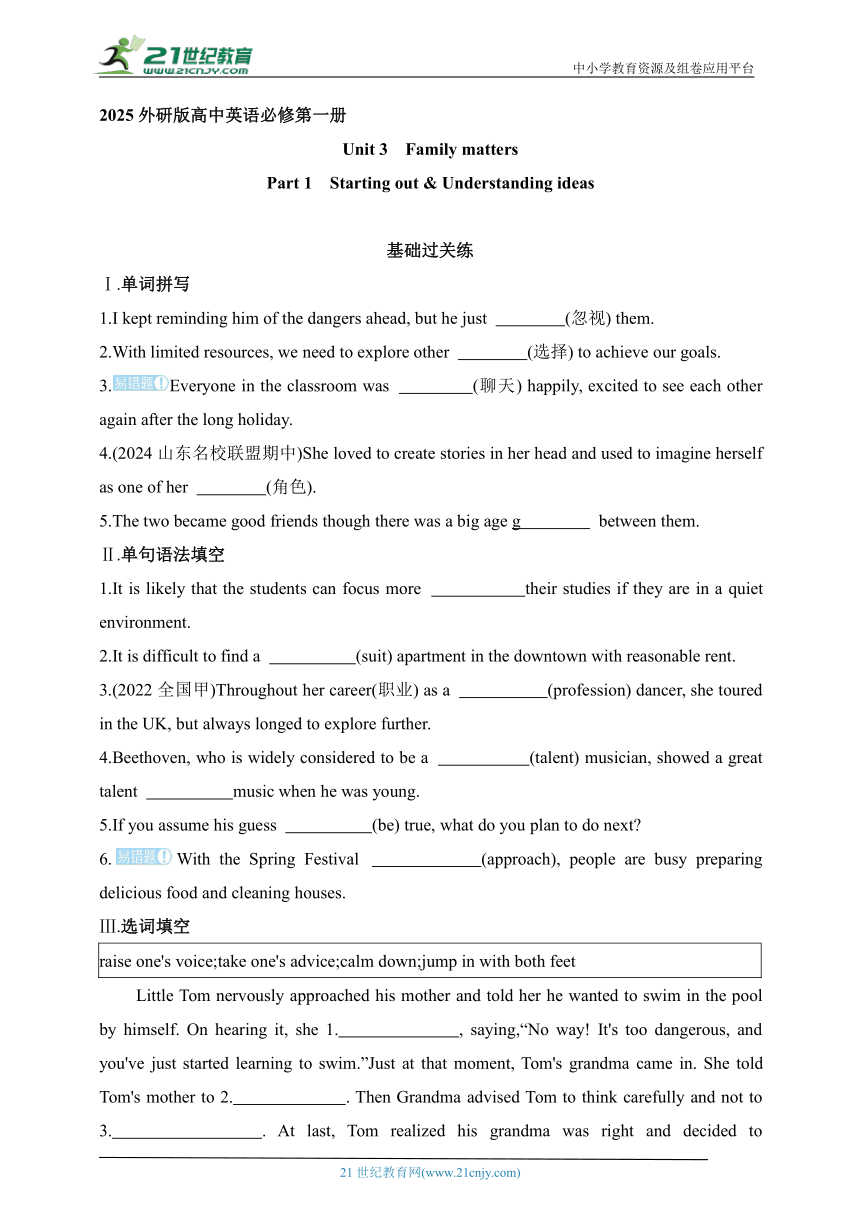
|
|
| 格式 | docx | ||
| 文件大小 | 350.5KB | ||
| 资源类型 | 试卷 | ||
| 版本资源 | 外研版(2019) | ||
| 科目 | 英语 | ||
| 更新时间 | 2024-06-21 11:00:08 | ||
图片预览

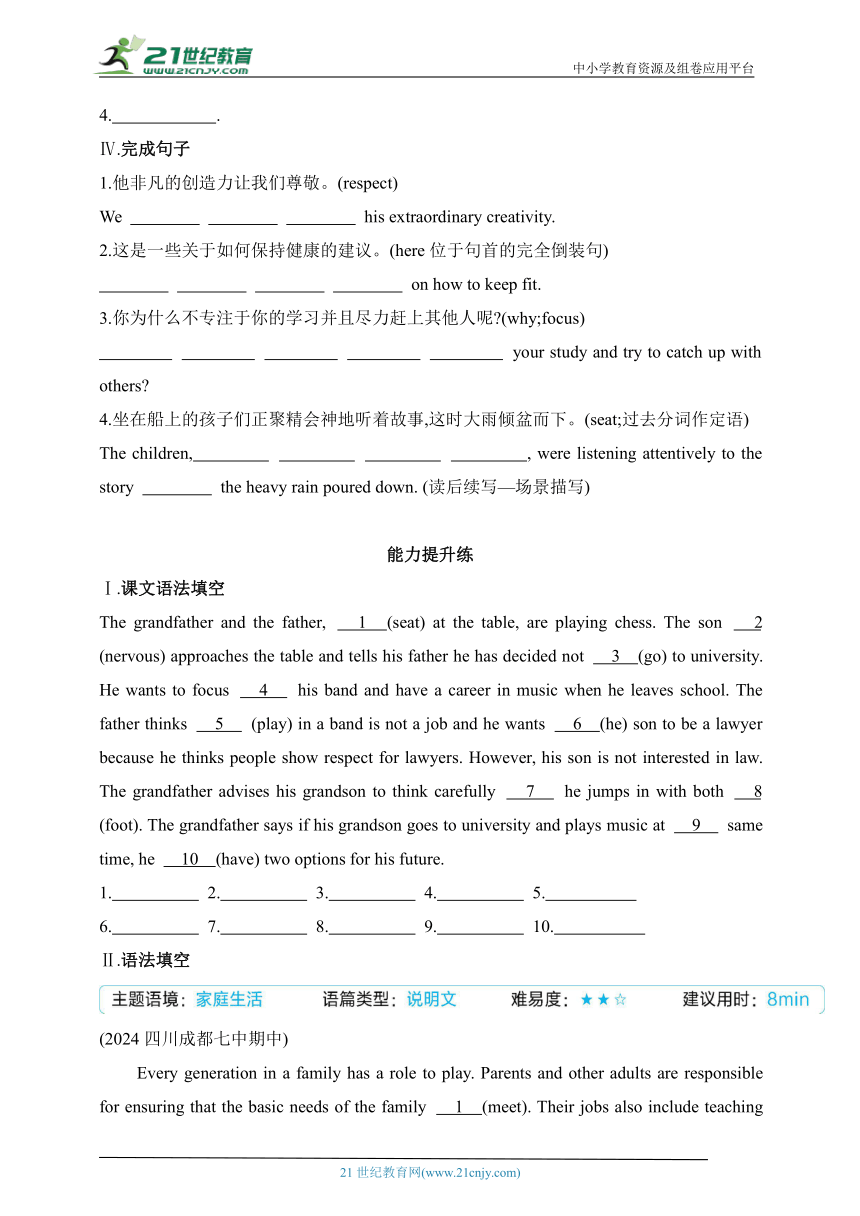
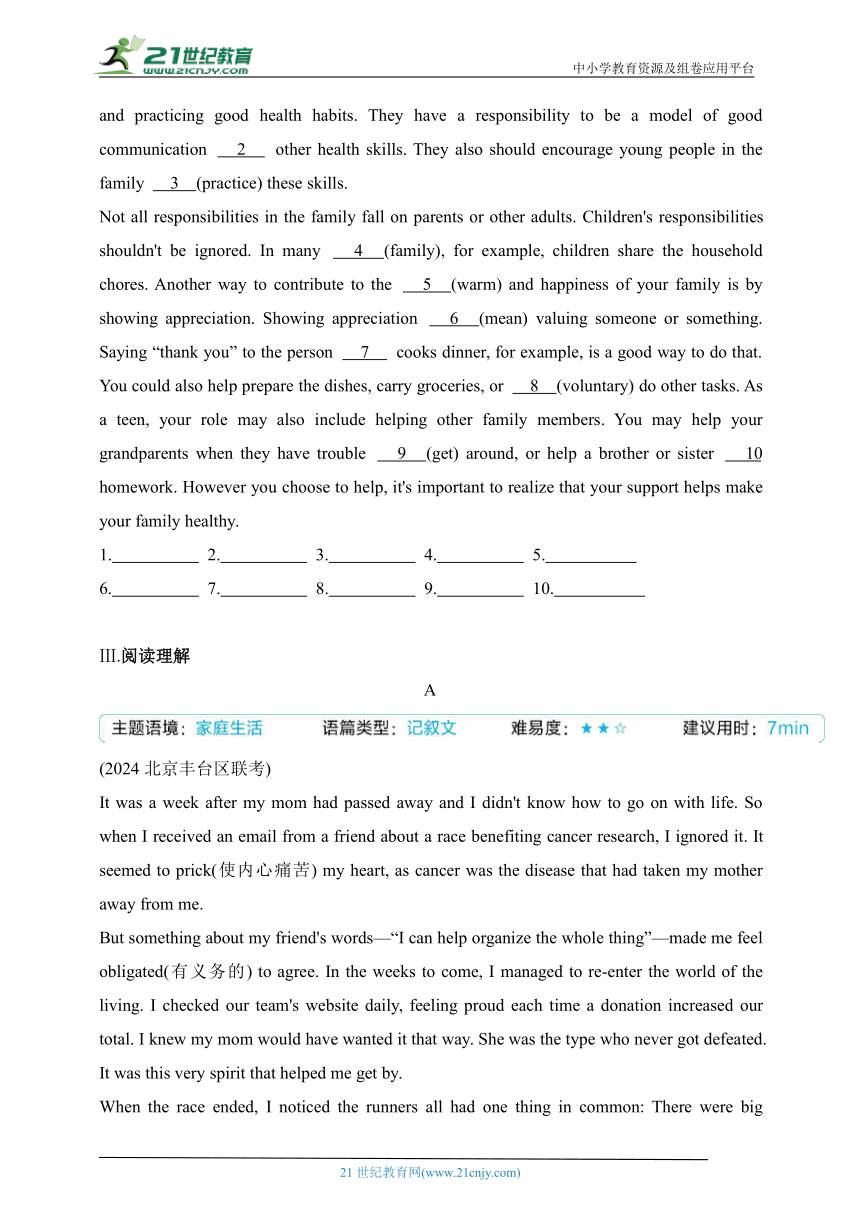
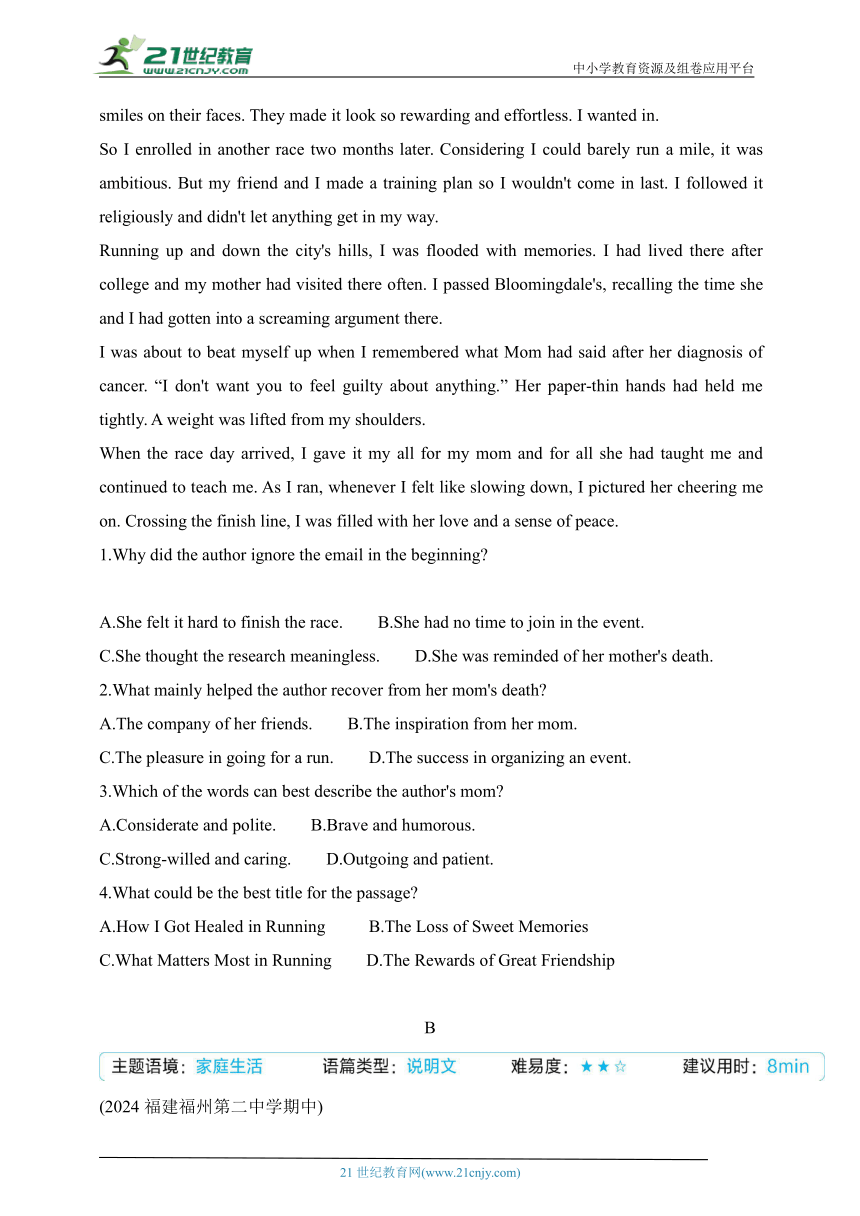
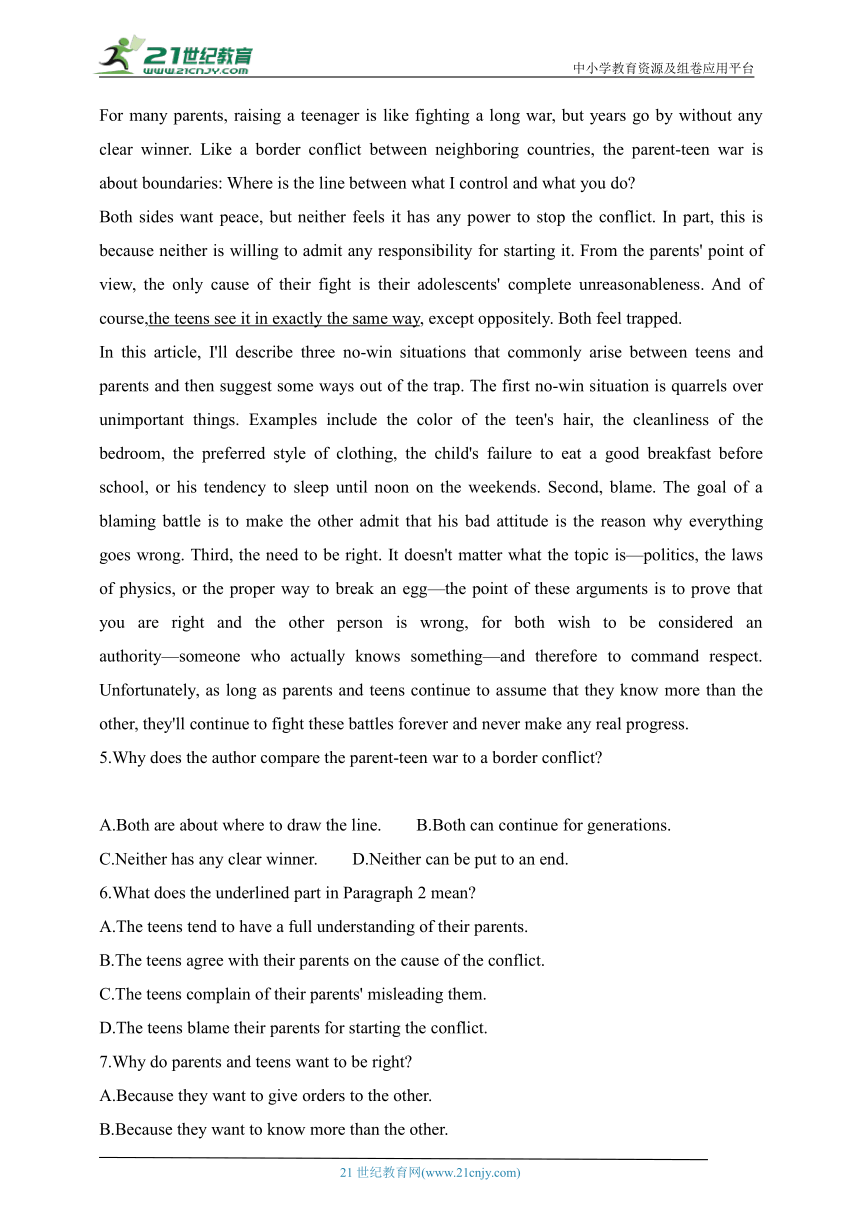
文档简介
中小学教育资源及组卷应用平台
2025外研版高中英语必修第一册
Unit 3 Family matters
Part 1 Starting out & Understanding ideas
基础过关练
Ⅰ.单词拼写
1.I kept reminding him of the dangers ahead, but he just (忽视) them.
2.With limited resources, we need to explore other (选择) to achieve our goals.
3.Everyone in the classroom was (聊天) happily, excited to see each other again after the long holiday.
4.(2024山东名校联盟期中)She loved to create stories in her head and used to imagine herself as one of her (角色).
5.The two became good friends though there was a big age g between them.
Ⅱ.单句语法填空
1.It is likely that the students can focus more their studies if they are in a quiet environment.
2.It is difficult to find a (suit) apartment in the downtown with reasonable rent.
3.(2022全国甲)Throughout her career(职业) as a (profession) dancer, she toured in the UK, but always longed to explore further.
4.Beethoven, who is widely considered to be a (talent) musician, showed a great talent music when he was young.
5.If you assume his guess (be) true, what do you plan to do next
6.With the Spring Festival (approach), people are busy preparing delicious food and cleaning houses.
Ⅲ.选词填空
raise one's voice;take one's advice;calm down;jump in with both feet
Little Tom nervously approached his mother and told her he wanted to swim in the pool by himself. On hearing it, she 1. , saying,“No way! It's too dangerous, and you've just started learning to swim.”Just at that moment, Tom's grandma came in. She told Tom's mother to 2. . Then Grandma advised Tom to think carefully and not to 3. . At last, Tom realized his grandma was right and decided to 4. .
Ⅳ.完成句子
1.他非凡的创造力让我们尊敬。(respect)
We his extraordinary creativity.
2.这是一些关于如何保持健康的建议。(here位于句首的完全倒装句)
on how to keep fit.
3.你为什么不专注于你的学习并且尽力赶上其他人呢 (why;focus)
your study and try to catch up with others
4.坐在船上的孩子们正聚精会神地听着故事,这时大雨倾盆而下。(seat;过去分词作定语)
The children, , were listening attentively to the story the heavy rain poured down. (读后续写—场景描写)
能力提升练
Ⅰ.课文语法填空
The grandfather and the father, 1 (seat) at the table, are playing chess. The son 2 (nervous) approaches the table and tells his father he has decided not 3 (go) to university. He wants to focus 4 his band and have a career in music when he leaves school. The father thinks 5 (play) in a band is not a job and he wants 6 (he) son to be a lawyer because he thinks people show respect for lawyers. However, his son is not interested in law. The grandfather advises his grandson to think carefully 7 he jumps in with both 8 (foot). The grandfather says if his grandson goes to university and plays music at 9 same time, he 10 (have) two options for his future.
1. 2. 3. 4. 5.
6. 7. 8. 9. 10.
Ⅱ.语法填空
(2024四川成都七中期中)
Every generation in a family has a role to play. Parents and other adults are responsible for ensuring that the basic needs of the family 1 (meet). Their jobs also include teaching and practicing good health habits. They have a responsibility to be a model of good communication 2 other health skills. They also should encourage young people in the family 3 (practice) these skills.
Not all responsibilities in the family fall on parents or other adults. Children's responsibilities shouldn't be ignored. In many 4 (family), for example, children share the household chores. Another way to contribute to the 5 (warm) and happiness of your family is by showing appreciation. Showing appreciation 6 (mean) valuing someone or something. Saying “thank you” to the person 7 cooks dinner, for example, is a good way to do that. You could also help prepare the dishes, carry groceries, or 8 (voluntary) do other tasks. As a teen, your role may also include helping other family members. You may help your grandparents when they have trouble 9 (get) around, or help a brother or sister 10 homework. However you choose to help, it's important to realize that your support helps make your family healthy.
1. 2. 3. 4. 5.
6. 7. 8. 9. 10.
Ⅲ.阅读理解
A
(2024北京丰台区联考)
It was a week after my mom had passed away and I didn't know how to go on with life. So when I received an email from a friend about a race benefiting cancer research, I ignored it. It seemed to prick(使内心痛苦) my heart, as cancer was the disease that had taken my mother away from me.
But something about my friend's words—“I can help organize the whole thing”—made me feel obligated(有义务的) to agree. In the weeks to come, I managed to re-enter the world of the living. I checked our team's website daily, feeling proud each time a donation increased our total. I knew my mom would have wanted it that way. She was the type who never got defeated. It was this very spirit that helped me get by.
When the race ended, I noticed the runners all had one thing in common: There were big smiles on their faces. They made it look so rewarding and effortless. I wanted in.
So I enrolled in another race two months later. Considering I could barely run a mile, it was ambitious. But my friend and I made a training plan so I wouldn't come in last. I followed it religiously and didn't let anything get in my way.
Running up and down the city's hills, I was flooded with memories. I had lived there after college and my mother had visited there often. I passed Bloomingdale's, recalling the time she and I had gotten into a screaming argument there.
I was about to beat myself up when I remembered what Mom had said after her diagnosis of cancer. “I don't want you to feel guilty about anything.” Her paper-thin hands had held me tightly. A weight was lifted from my shoulders.
When the race day arrived, I gave it my all for my mom and for all she had taught me and continued to teach me. As I ran, whenever I felt like slowing down, I pictured her cheering me on. Crossing the finish line, I was filled with her love and a sense of peace.
1.Why did the author ignore the email in the beginning
A.She felt it hard to finish the race. B.She had no time to join in the event.
C.She thought the research meaningless. D.She was reminded of her mother's death.
2.What mainly helped the author recover from her mom's death
A.The company of her friends. B.The inspiration from her mom.
C.The pleasure in going for a run. D.The success in organizing an event.
3.Which of the words can best describe the author's mom
A.Considerate and polite. B.Brave and humorous.
C.Strong-willed and caring. D.Outgoing and patient.
4.What could be the best title for the passage
A.How I Got Healed in Running B.The Loss of Sweet Memories
C.What Matters Most in Running D.The Rewards of Great Friendship
B
(2024福建福州第二中学期中)
For many parents, raising a teenager is like fighting a long war, but years go by without any clear winner. Like a border conflict between neighboring countries, the parent-teen war is about boundaries: Where is the line between what I control and what you do
Both sides want peace, but neither feels it has any power to stop the conflict. In part, this is because neither is willing to admit any responsibility for starting it. From the parents' point of view, the only cause of their fight is their adolescents' complete unreasonableness. And of course,the teens see it in exactly the same way, except oppositely. Both feel trapped.
In this article, I'll describe three no-win situations that commonly arise between teens and parents and then suggest some ways out of the trap. The first no-win situation is quarrels over unimportant things. Examples include the color of the teen's hair, the cleanliness of the bedroom, the preferred style of clothing, the child's failure to eat a good breakfast before school, or his tendency to sleep until noon on the weekends. Second, blame. The goal of a blaming battle is to make the other admit that his bad attitude is the reason why everything goes wrong. Third, the need to be right. It doesn't matter what the topic is—politics, the laws of physics, or the proper way to break an egg—the point of these arguments is to prove that you are right and the other person is wrong, for both wish to be considered an authority—someone who actually knows something—and therefore to command respect. Unfortunately, as long as parents and teens continue to assume that they know more than the other, they'll continue to fight these battles forever and never make any real progress.
5.Why does the author compare the parent-teen war to a border conflict
A.Both are about where to draw the line. B.Both can continue for generations.
C.Neither has any clear winner. D.Neither can be put to an end.
6.What does the underlined part in Paragraph 2 mean
A.The teens tend to have a full understanding of their parents.
B.The teens agree with their parents on the cause of the conflict.
C.The teens complain of their parents' misleading them.
D.The teens blame their parents for starting the conflict.
7.Why do parents and teens want to be right
A.Because they want to give orders to the other.
B.Because they want to know more than the other.
C.Because they want to gain respect from the other.
D.Because they want to get the other to behave properly.
8.What will the author most probably discuss in the paragraph that follows
A.Solutions to the parent-teen problems.
B.Examples of the parent-teen war.
C.Causes of the parent-teen conflicts.
D.The future of the parent-teen relationship.
答案与分层梯度式解析
Unit 3 Family matters
Part 1 Starting out & Understanding ideas
基础过关练
Ⅰ.1.ignored 2.options 3.chatting 4.characters 5.gap
Ⅱ.1.on/upon 考查介词。句意:如果学生处于安静的环境中,他们很可能会更加专注于功课。focus on/upon...意为“把(注意力、精力等)集中于……”,故本空应用介词on或upon。
2.suitable 考查形容词。句意:在市中心很难找到一套租金公道的合适的公寓。本空修饰名词apartment,故应用形容词suitable作定语,意为“合适的”。
3.professional 考查形容词。句意:在她的职业舞者生涯中,她曾在英国巡回演出,但一直渴望进一步探索。本空修饰名词dancer,故应用形容词professional作定语,意为“职业的,专业的”。
类比启发
名词+-al→形容词的还有:nation国家→national国家的;tradition传统→traditional传统的;music音乐→musical音乐的。
4.talented;for 考查形容词和介词。句意:贝多芬被普遍认为是一位有天赋的音乐家,他年轻时就表现出了卓越的音乐天赋。第一空修饰名词musician,故应用形容词talented,意为“有天赋的;有才能的”;show a talent for...意为“表现出……的天赋”,故第二空应用介词for。
5.to be 考查非谓语动词。句意:如果你认为他的猜测是真的,你下一步打算做什么 assume sb./sth. to be...意为“认为某人/某事是……”,故本空应用不定式作宾语补足语。
6.approaching 考查非谓语动词。句意:随着春节的临近,人们正忙着准备美味的食物和打扫房子。“With the Spring Festival (approach)”为with的复合结构,动词approach和宾语the Spring Festival之间为主动关系,故本空应用现在分词作宾语补足语。
Ⅲ.1.raised her voice 2.calm down 3.jump in with both feet 4.take her advice
Ⅳ.1.respect him for 2.Here are some suggestions
3.Why don't you focus on/upon 4.seated in the boat/ship;when
能力提升练
Ⅰ.1.seated 考查非谓语动词。本句中已有谓语are playing,故此处应用非谓语动词。提示词seat作动词讲时,意为“向……提供座位;(使)就座”,和句子主语The grandfather and the father之间为逻辑上的被动关系,故本空应用过去分词形式。
2.nervously 考查副词。本空修饰动词approaches,故应用副词nervously,意为“紧张地”。
3.to go 考查非谓语动词。decide not to do sth.意为“决定不做某事”,故本空应用不定式。
4.on/upon 考查介词。focus on/upon意为“专注于……”,故本空应用介词on或upon。
5.playing 考查非谓语动词。句意:父亲认为在乐队演奏不是一份工作,他想让他的儿子成为一名律师,因为他认为人们尊敬律师。 本句中的“ 5 (play) in a band is not a job”为宾语从句,其中“ 5 (play) in a band”为从句的主语。这里表示抽象的动作,应用动名词作主语。
6.his 考查代词。根据空后的名词son可知,本空应用形容词性物主代词。
7.before 考查连词。句意:爷爷建议他的孙子在不假思索地匆匆投入之前认真考虑。此处表示“在……以前”,故填before。
8.feet 考查固定用法。jump in with both feet意为“不假思索地匆匆投入”,故本空应用feet。
9.the 考查冠词。at the same time意为“同时”,故本空应填the。
10.will have 考查时态。句意:爷爷说如果他的孙子在上大学的同时演奏音乐,他的未来将有两个选择。由句意可知,此处表示将来要发生的动作,故用一般将来时。
Ⅱ.◎语篇解读 本文是一篇说明文。文章主要介绍了每个家庭成员都应在家庭中承担力所能及的责任和义务。
1.are met 考查时态、语态和主谓一致。句意:父母和其他成年人有责任确保家庭的基本需要得到满足。分析句子可知,设空处为that引导的宾语从句的谓语,联系上下文并结合语境可知,此处表示一般事实,应用一般现在时,且动词meet与主语the basic needs之间为被动关系,故本空应用一般现在时的被动语态,且主语为复数形式,故填are met。
2.and 考查连词。句意:他们有责任成为良好沟通和其他健康技能的榜样。空前good communication与空后other health skills之间为并列关系,共同作of的宾语,故本空应用并列连词and。
3.to practice 考查非谓语动词。句意:他们还应该鼓励家里的年轻人练习这些技能。encourage sb. to do sth.意为“鼓励某人做某事”,故本空应用动词不定式形式作宾语补足语。
4.families 考查名词复数。句意:例如,在许多家庭中,孩子们分担家务。根据空前的限定词many可知,本空应用名词复数形式。
5.warmth 考查名词。句意:另一种让你的家庭温暖和幸福的方式是表达感激。本空与空后的名词happiness并列,故本空应用名词形式。
类比启发
常见的以-th结尾的名词:truth(真理);wealth(财富);length(长度);width(宽度);depth(深度);warmth(温暖);strength(力量);health(健康);growth(成长)。一句串记:真理(truth)是一笔财富(wealth),它让我思考生命的长度(length)、宽度(width)和深度(depth),给我温暖(warmth)和力量(strength),促进我的健康(health)和成长(growth)。
6.means 考查时态及主谓一致。句意:表达感激意味着重视某人或某事。本句阐述客观事实,应用一般现在时,且句子主语为动名词短语,故本空应用动词的第三人称单数形式means。
7.who/that 考查定语从句。句意:例如,对做饭的人说“谢谢”就是一个很好的表达感激的方式。设空处无提示词,空前为名词person,空后句子缺少主语,故推测设空处引导定语从句。先行词为the person,本空在从句中作主语、指人,故本空应用关系代词who或that。
8.voluntarily 考查副词。句意:你也可以帮忙准备菜肴,搬运杂货,或者主动做其他工作。本空修饰动词do,故应用副词voluntarily作状语,意为“主动地”。
9.getting 考查非谓语动词。句意:当你的祖父母行动不便时,你可以帮助他们,或者帮助兄弟姐妹做家庭作业。have trouble (in) doing sth.意为“做某事有困难”,故本空应用动名词形式。
类比启发
以单个辅音字母结尾的重读闭音节动词,变动名词时,先双写这个辅音字母,再加-ing。如swim→swimming;run→running;sit→sitting;stop→stopping;put→putting;win→winning。
10.with 考查介词。help sb. with sth.意为“帮助某人处理某事”,故本空应用介词with。
【高频词汇】 1.ensure v.确保,保证 2.household chore家务活 3.contribute to有助于,促成 4.appreciation n.感激 5.value v.重视,珍视
【熟词生义】 meet v.满足
Ⅲ.A
◎语篇解读 本文是一篇记叙文。文章讲述了母亲去世之后,作者对母亲的回忆及母亲赐予作者的力量使她能够从悲伤中走出来,积极面对生活。
1.D 细节理解题。根据第一段中“It seemed to prick my heart, as cancer was the disease that had taken my mother away from me.”可知,作者最开始忽视这个电子邮件是因为这个比赛使作者想起了因癌症过世的母亲。故选D。
2.B 细节理解题。根据第二段中“She was the type who never got defeated. It was this very spirit that helped me get by.”可知,母亲永不言败的精神支撑作者从悲伤中恢复过来。故选B。
3.C 推理判断题。根据第二段中“She was the type who never got defeated. (她是那种永远不会被打败的人。)”可推知,作者的母亲意志力坚强;根据第六段中“I don't want you to feel guilty about anything.(我希望你对任何事情都不要感到内疚。)”可推知,母亲关心爱护作者。因此作者的母亲是一个意志坚强又体贴的人。故选C。A.体贴且有礼貌的;B.勇敢且幽默的;D.外向且有耐心的。
4.A 主旨大意题。通读全文并根据第二段中“It was this very spirit that helped me get by.”和最后一段中“As I ran, whenever I felt like slowing down, I pictured her cheering me on. Crossing the finish line, I was filled with her love and a sense of peace.”可知,母亲治愈了作者,正是靠着想象母亲的鼓励,她才能完成比赛。故A项“我是如何在跑步中被治愈的”适合作文章的最佳标题。
【高频词汇】 1.pass away去世 2.donation n.捐赠
3.get by应付下去,勉强过活 4.rewarding adj.有益的,值得做的 5.effortless adj.不费劲的,容易的 6.enroll in加入,参加 7.barely adv.几乎不;勉强可能
8.ambitious adj.费力的;有雄心的 9.recall v.回忆起 10.cheer sb. on为某人加油
【差距词汇】 1.religiously adv.十分认真地 2.beat oneself up (about/over sth.)(为某事)过分自责
3.diagnosis n.诊断
长难句
原句 I was about to beat myself up when I remembered what Mom had said after her diagnosis of cancer.
分析 本句为“sb. be about to do sth. when...” 句型,意为“某人正要做某事,这时……”;what引导宾语从句,作动词remembered的宾语。
译文 我正要自责,这时我想起妈妈在被诊断为癌症后所说的话。
B
◎语篇解读 本文是一篇说明文。文章分析了父母和孩子之间冲突的实质、原因和表现形式等。
5.A 推理判断题。根据第一段中“Like a border conflict between neighboring countries, the parent-teen war is about boundaries: Where is the line between what I control and what you do ”可知,就像邻国之间的边界冲突一样,父母与青少年之间的战争是关于边界的:我所控制的和你所做的之间的界限在哪里 由此可推知,作者把二者相比,是因为二者都是关于界限的。故选A。
6.D 句意猜测题。根据画线部分的前一句“From the parents' point of view, the only cause of their fight is their adolescents' complete unreasonableness.”可知,从父母的角度来看,唯一的原因是他们的孩子完全不讲道理。故画线句“the teens see it in exactly the same way”指的是孩子也用相同的方式看这个问题,即孩子认为父母不讲道理,引起了矛盾。故选D。
7.C 细节理解题。根据最后一段中“the point of these arguments is to prove that you are right and the other person is wrong, for both wish to be considered an authority—someone who actually knows something—and therefore to command respect.”可知,这些争论的重点是证明你是对的,而另一个人是错的,因为双方都希望被视为权威——一个真正了解某事的人——从而博得尊重。故选C。
8.A 推理判断题。根据最后一段中“In this article, I'll describe three no-win situations that commonly arise between teens and parents and then suggest some ways out of the trap.”可知,在这篇文章中,作者将描述三种通常出现在青少年和父母之间的必败的情况,然后推荐一些方法来摆脱这种陷阱。最后一段中介绍了三种情况及具体表现,所以推测下段应该是问题的解决办法。故选A。
【高频词汇】 1.conflict n.冲突,争执 2.in part 在某种程度上 3.from sb.'s point of view从某人的角度来看
4.adolescent n.青少年 5.oppositely adv.相反地
6.arise v.出现,产生 7.tendency n.偏好;倾向,趋势
【熟词生义】 command v.应得;博得;值得
长难句
原句 It doesn't matter what the topic is—politics, the laws of physics, or the proper way to break an egg—the point of these arguments is to prove that you are right and the other person is wrong, for both wish to be considered an authority—someone who actually knows something—and therefore to command respect.
分析 本句中,It作形式主语,what引导的主语从句作真正的主语;不定式“to prove...is wrong”作表语;that引导宾语从句,作动词prove的宾语;for为并列连词,意为“因为”;who引导定语从句,修饰先行词someone。
译文 话题是什么并不重要——政治、物理定律,或者打破鸡蛋的正确方法——这些争论的目的是证明你是对的,而另一个人是错的,因为双方都希望被视为权威——一个真正了解某事的人——并因此博得尊重。
21世纪教育网 www.21cnjy.com 精品试卷·第 2 页 (共 2 页)
21世纪教育网(www.21cnjy.com)
2025外研版高中英语必修第一册
Unit 3 Family matters
Part 1 Starting out & Understanding ideas
基础过关练
Ⅰ.单词拼写
1.I kept reminding him of the dangers ahead, but he just (忽视) them.
2.With limited resources, we need to explore other (选择) to achieve our goals.
3.Everyone in the classroom was (聊天) happily, excited to see each other again after the long holiday.
4.(2024山东名校联盟期中)She loved to create stories in her head and used to imagine herself as one of her (角色).
5.The two became good friends though there was a big age g between them.
Ⅱ.单句语法填空
1.It is likely that the students can focus more their studies if they are in a quiet environment.
2.It is difficult to find a (suit) apartment in the downtown with reasonable rent.
3.(2022全国甲)Throughout her career(职业) as a (profession) dancer, she toured in the UK, but always longed to explore further.
4.Beethoven, who is widely considered to be a (talent) musician, showed a great talent music when he was young.
5.If you assume his guess (be) true, what do you plan to do next
6.With the Spring Festival (approach), people are busy preparing delicious food and cleaning houses.
Ⅲ.选词填空
raise one's voice;take one's advice;calm down;jump in with both feet
Little Tom nervously approached his mother and told her he wanted to swim in the pool by himself. On hearing it, she 1. , saying,“No way! It's too dangerous, and you've just started learning to swim.”Just at that moment, Tom's grandma came in. She told Tom's mother to 2. . Then Grandma advised Tom to think carefully and not to 3. . At last, Tom realized his grandma was right and decided to 4. .
Ⅳ.完成句子
1.他非凡的创造力让我们尊敬。(respect)
We his extraordinary creativity.
2.这是一些关于如何保持健康的建议。(here位于句首的完全倒装句)
on how to keep fit.
3.你为什么不专注于你的学习并且尽力赶上其他人呢 (why;focus)
your study and try to catch up with others
4.坐在船上的孩子们正聚精会神地听着故事,这时大雨倾盆而下。(seat;过去分词作定语)
The children, , were listening attentively to the story the heavy rain poured down. (读后续写—场景描写)
能力提升练
Ⅰ.课文语法填空
The grandfather and the father, 1 (seat) at the table, are playing chess. The son 2 (nervous) approaches the table and tells his father he has decided not 3 (go) to university. He wants to focus 4 his band and have a career in music when he leaves school. The father thinks 5 (play) in a band is not a job and he wants 6 (he) son to be a lawyer because he thinks people show respect for lawyers. However, his son is not interested in law. The grandfather advises his grandson to think carefully 7 he jumps in with both 8 (foot). The grandfather says if his grandson goes to university and plays music at 9 same time, he 10 (have) two options for his future.
1. 2. 3. 4. 5.
6. 7. 8. 9. 10.
Ⅱ.语法填空
(2024四川成都七中期中)
Every generation in a family has a role to play. Parents and other adults are responsible for ensuring that the basic needs of the family 1 (meet). Their jobs also include teaching and practicing good health habits. They have a responsibility to be a model of good communication 2 other health skills. They also should encourage young people in the family 3 (practice) these skills.
Not all responsibilities in the family fall on parents or other adults. Children's responsibilities shouldn't be ignored. In many 4 (family), for example, children share the household chores. Another way to contribute to the 5 (warm) and happiness of your family is by showing appreciation. Showing appreciation 6 (mean) valuing someone or something. Saying “thank you” to the person 7 cooks dinner, for example, is a good way to do that. You could also help prepare the dishes, carry groceries, or 8 (voluntary) do other tasks. As a teen, your role may also include helping other family members. You may help your grandparents when they have trouble 9 (get) around, or help a brother or sister 10 homework. However you choose to help, it's important to realize that your support helps make your family healthy.
1. 2. 3. 4. 5.
6. 7. 8. 9. 10.
Ⅲ.阅读理解
A
(2024北京丰台区联考)
It was a week after my mom had passed away and I didn't know how to go on with life. So when I received an email from a friend about a race benefiting cancer research, I ignored it. It seemed to prick(使内心痛苦) my heart, as cancer was the disease that had taken my mother away from me.
But something about my friend's words—“I can help organize the whole thing”—made me feel obligated(有义务的) to agree. In the weeks to come, I managed to re-enter the world of the living. I checked our team's website daily, feeling proud each time a donation increased our total. I knew my mom would have wanted it that way. She was the type who never got defeated. It was this very spirit that helped me get by.
When the race ended, I noticed the runners all had one thing in common: There were big smiles on their faces. They made it look so rewarding and effortless. I wanted in.
So I enrolled in another race two months later. Considering I could barely run a mile, it was ambitious. But my friend and I made a training plan so I wouldn't come in last. I followed it religiously and didn't let anything get in my way.
Running up and down the city's hills, I was flooded with memories. I had lived there after college and my mother had visited there often. I passed Bloomingdale's, recalling the time she and I had gotten into a screaming argument there.
I was about to beat myself up when I remembered what Mom had said after her diagnosis of cancer. “I don't want you to feel guilty about anything.” Her paper-thin hands had held me tightly. A weight was lifted from my shoulders.
When the race day arrived, I gave it my all for my mom and for all she had taught me and continued to teach me. As I ran, whenever I felt like slowing down, I pictured her cheering me on. Crossing the finish line, I was filled with her love and a sense of peace.
1.Why did the author ignore the email in the beginning
A.She felt it hard to finish the race. B.She had no time to join in the event.
C.She thought the research meaningless. D.She was reminded of her mother's death.
2.What mainly helped the author recover from her mom's death
A.The company of her friends. B.The inspiration from her mom.
C.The pleasure in going for a run. D.The success in organizing an event.
3.Which of the words can best describe the author's mom
A.Considerate and polite. B.Brave and humorous.
C.Strong-willed and caring. D.Outgoing and patient.
4.What could be the best title for the passage
A.How I Got Healed in Running B.The Loss of Sweet Memories
C.What Matters Most in Running D.The Rewards of Great Friendship
B
(2024福建福州第二中学期中)
For many parents, raising a teenager is like fighting a long war, but years go by without any clear winner. Like a border conflict between neighboring countries, the parent-teen war is about boundaries: Where is the line between what I control and what you do
Both sides want peace, but neither feels it has any power to stop the conflict. In part, this is because neither is willing to admit any responsibility for starting it. From the parents' point of view, the only cause of their fight is their adolescents' complete unreasonableness. And of course,the teens see it in exactly the same way, except oppositely. Both feel trapped.
In this article, I'll describe three no-win situations that commonly arise between teens and parents and then suggest some ways out of the trap. The first no-win situation is quarrels over unimportant things. Examples include the color of the teen's hair, the cleanliness of the bedroom, the preferred style of clothing, the child's failure to eat a good breakfast before school, or his tendency to sleep until noon on the weekends. Second, blame. The goal of a blaming battle is to make the other admit that his bad attitude is the reason why everything goes wrong. Third, the need to be right. It doesn't matter what the topic is—politics, the laws of physics, or the proper way to break an egg—the point of these arguments is to prove that you are right and the other person is wrong, for both wish to be considered an authority—someone who actually knows something—and therefore to command respect. Unfortunately, as long as parents and teens continue to assume that they know more than the other, they'll continue to fight these battles forever and never make any real progress.
5.Why does the author compare the parent-teen war to a border conflict
A.Both are about where to draw the line. B.Both can continue for generations.
C.Neither has any clear winner. D.Neither can be put to an end.
6.What does the underlined part in Paragraph 2 mean
A.The teens tend to have a full understanding of their parents.
B.The teens agree with their parents on the cause of the conflict.
C.The teens complain of their parents' misleading them.
D.The teens blame their parents for starting the conflict.
7.Why do parents and teens want to be right
A.Because they want to give orders to the other.
B.Because they want to know more than the other.
C.Because they want to gain respect from the other.
D.Because they want to get the other to behave properly.
8.What will the author most probably discuss in the paragraph that follows
A.Solutions to the parent-teen problems.
B.Examples of the parent-teen war.
C.Causes of the parent-teen conflicts.
D.The future of the parent-teen relationship.
答案与分层梯度式解析
Unit 3 Family matters
Part 1 Starting out & Understanding ideas
基础过关练
Ⅰ.1.ignored 2.options 3.chatting 4.characters 5.gap
Ⅱ.1.on/upon 考查介词。句意:如果学生处于安静的环境中,他们很可能会更加专注于功课。focus on/upon...意为“把(注意力、精力等)集中于……”,故本空应用介词on或upon。
2.suitable 考查形容词。句意:在市中心很难找到一套租金公道的合适的公寓。本空修饰名词apartment,故应用形容词suitable作定语,意为“合适的”。
3.professional 考查形容词。句意:在她的职业舞者生涯中,她曾在英国巡回演出,但一直渴望进一步探索。本空修饰名词dancer,故应用形容词professional作定语,意为“职业的,专业的”。
类比启发
名词+-al→形容词的还有:nation国家→national国家的;tradition传统→traditional传统的;music音乐→musical音乐的。
4.talented;for 考查形容词和介词。句意:贝多芬被普遍认为是一位有天赋的音乐家,他年轻时就表现出了卓越的音乐天赋。第一空修饰名词musician,故应用形容词talented,意为“有天赋的;有才能的”;show a talent for...意为“表现出……的天赋”,故第二空应用介词for。
5.to be 考查非谓语动词。句意:如果你认为他的猜测是真的,你下一步打算做什么 assume sb./sth. to be...意为“认为某人/某事是……”,故本空应用不定式作宾语补足语。
6.approaching 考查非谓语动词。句意:随着春节的临近,人们正忙着准备美味的食物和打扫房子。“With the Spring Festival (approach)”为with的复合结构,动词approach和宾语the Spring Festival之间为主动关系,故本空应用现在分词作宾语补足语。
Ⅲ.1.raised her voice 2.calm down 3.jump in with both feet 4.take her advice
Ⅳ.1.respect him for 2.Here are some suggestions
3.Why don't you focus on/upon 4.seated in the boat/ship;when
能力提升练
Ⅰ.1.seated 考查非谓语动词。本句中已有谓语are playing,故此处应用非谓语动词。提示词seat作动词讲时,意为“向……提供座位;(使)就座”,和句子主语The grandfather and the father之间为逻辑上的被动关系,故本空应用过去分词形式。
2.nervously 考查副词。本空修饰动词approaches,故应用副词nervously,意为“紧张地”。
3.to go 考查非谓语动词。decide not to do sth.意为“决定不做某事”,故本空应用不定式。
4.on/upon 考查介词。focus on/upon意为“专注于……”,故本空应用介词on或upon。
5.playing 考查非谓语动词。句意:父亲认为在乐队演奏不是一份工作,他想让他的儿子成为一名律师,因为他认为人们尊敬律师。 本句中的“ 5 (play) in a band is not a job”为宾语从句,其中“ 5 (play) in a band”为从句的主语。这里表示抽象的动作,应用动名词作主语。
6.his 考查代词。根据空后的名词son可知,本空应用形容词性物主代词。
7.before 考查连词。句意:爷爷建议他的孙子在不假思索地匆匆投入之前认真考虑。此处表示“在……以前”,故填before。
8.feet 考查固定用法。jump in with both feet意为“不假思索地匆匆投入”,故本空应用feet。
9.the 考查冠词。at the same time意为“同时”,故本空应填the。
10.will have 考查时态。句意:爷爷说如果他的孙子在上大学的同时演奏音乐,他的未来将有两个选择。由句意可知,此处表示将来要发生的动作,故用一般将来时。
Ⅱ.◎语篇解读 本文是一篇说明文。文章主要介绍了每个家庭成员都应在家庭中承担力所能及的责任和义务。
1.are met 考查时态、语态和主谓一致。句意:父母和其他成年人有责任确保家庭的基本需要得到满足。分析句子可知,设空处为that引导的宾语从句的谓语,联系上下文并结合语境可知,此处表示一般事实,应用一般现在时,且动词meet与主语the basic needs之间为被动关系,故本空应用一般现在时的被动语态,且主语为复数形式,故填are met。
2.and 考查连词。句意:他们有责任成为良好沟通和其他健康技能的榜样。空前good communication与空后other health skills之间为并列关系,共同作of的宾语,故本空应用并列连词and。
3.to practice 考查非谓语动词。句意:他们还应该鼓励家里的年轻人练习这些技能。encourage sb. to do sth.意为“鼓励某人做某事”,故本空应用动词不定式形式作宾语补足语。
4.families 考查名词复数。句意:例如,在许多家庭中,孩子们分担家务。根据空前的限定词many可知,本空应用名词复数形式。
5.warmth 考查名词。句意:另一种让你的家庭温暖和幸福的方式是表达感激。本空与空后的名词happiness并列,故本空应用名词形式。
类比启发
常见的以-th结尾的名词:truth(真理);wealth(财富);length(长度);width(宽度);depth(深度);warmth(温暖);strength(力量);health(健康);growth(成长)。一句串记:真理(truth)是一笔财富(wealth),它让我思考生命的长度(length)、宽度(width)和深度(depth),给我温暖(warmth)和力量(strength),促进我的健康(health)和成长(growth)。
6.means 考查时态及主谓一致。句意:表达感激意味着重视某人或某事。本句阐述客观事实,应用一般现在时,且句子主语为动名词短语,故本空应用动词的第三人称单数形式means。
7.who/that 考查定语从句。句意:例如,对做饭的人说“谢谢”就是一个很好的表达感激的方式。设空处无提示词,空前为名词person,空后句子缺少主语,故推测设空处引导定语从句。先行词为the person,本空在从句中作主语、指人,故本空应用关系代词who或that。
8.voluntarily 考查副词。句意:你也可以帮忙准备菜肴,搬运杂货,或者主动做其他工作。本空修饰动词do,故应用副词voluntarily作状语,意为“主动地”。
9.getting 考查非谓语动词。句意:当你的祖父母行动不便时,你可以帮助他们,或者帮助兄弟姐妹做家庭作业。have trouble (in) doing sth.意为“做某事有困难”,故本空应用动名词形式。
类比启发
以单个辅音字母结尾的重读闭音节动词,变动名词时,先双写这个辅音字母,再加-ing。如swim→swimming;run→running;sit→sitting;stop→stopping;put→putting;win→winning。
10.with 考查介词。help sb. with sth.意为“帮助某人处理某事”,故本空应用介词with。
【高频词汇】 1.ensure v.确保,保证 2.household chore家务活 3.contribute to有助于,促成 4.appreciation n.感激 5.value v.重视,珍视
【熟词生义】 meet v.满足
Ⅲ.A
◎语篇解读 本文是一篇记叙文。文章讲述了母亲去世之后,作者对母亲的回忆及母亲赐予作者的力量使她能够从悲伤中走出来,积极面对生活。
1.D 细节理解题。根据第一段中“It seemed to prick my heart, as cancer was the disease that had taken my mother away from me.”可知,作者最开始忽视这个电子邮件是因为这个比赛使作者想起了因癌症过世的母亲。故选D。
2.B 细节理解题。根据第二段中“She was the type who never got defeated. It was this very spirit that helped me get by.”可知,母亲永不言败的精神支撑作者从悲伤中恢复过来。故选B。
3.C 推理判断题。根据第二段中“She was the type who never got defeated. (她是那种永远不会被打败的人。)”可推知,作者的母亲意志力坚强;根据第六段中“I don't want you to feel guilty about anything.(我希望你对任何事情都不要感到内疚。)”可推知,母亲关心爱护作者。因此作者的母亲是一个意志坚强又体贴的人。故选C。A.体贴且有礼貌的;B.勇敢且幽默的;D.外向且有耐心的。
4.A 主旨大意题。通读全文并根据第二段中“It was this very spirit that helped me get by.”和最后一段中“As I ran, whenever I felt like slowing down, I pictured her cheering me on. Crossing the finish line, I was filled with her love and a sense of peace.”可知,母亲治愈了作者,正是靠着想象母亲的鼓励,她才能完成比赛。故A项“我是如何在跑步中被治愈的”适合作文章的最佳标题。
【高频词汇】 1.pass away去世 2.donation n.捐赠
3.get by应付下去,勉强过活 4.rewarding adj.有益的,值得做的 5.effortless adj.不费劲的,容易的 6.enroll in加入,参加 7.barely adv.几乎不;勉强可能
8.ambitious adj.费力的;有雄心的 9.recall v.回忆起 10.cheer sb. on为某人加油
【差距词汇】 1.religiously adv.十分认真地 2.beat oneself up (about/over sth.)(为某事)过分自责
3.diagnosis n.诊断
长难句
原句 I was about to beat myself up when I remembered what Mom had said after her diagnosis of cancer.
分析 本句为“sb. be about to do sth. when...” 句型,意为“某人正要做某事,这时……”;what引导宾语从句,作动词remembered的宾语。
译文 我正要自责,这时我想起妈妈在被诊断为癌症后所说的话。
B
◎语篇解读 本文是一篇说明文。文章分析了父母和孩子之间冲突的实质、原因和表现形式等。
5.A 推理判断题。根据第一段中“Like a border conflict between neighboring countries, the parent-teen war is about boundaries: Where is the line between what I control and what you do ”可知,就像邻国之间的边界冲突一样,父母与青少年之间的战争是关于边界的:我所控制的和你所做的之间的界限在哪里 由此可推知,作者把二者相比,是因为二者都是关于界限的。故选A。
6.D 句意猜测题。根据画线部分的前一句“From the parents' point of view, the only cause of their fight is their adolescents' complete unreasonableness.”可知,从父母的角度来看,唯一的原因是他们的孩子完全不讲道理。故画线句“the teens see it in exactly the same way”指的是孩子也用相同的方式看这个问题,即孩子认为父母不讲道理,引起了矛盾。故选D。
7.C 细节理解题。根据最后一段中“the point of these arguments is to prove that you are right and the other person is wrong, for both wish to be considered an authority—someone who actually knows something—and therefore to command respect.”可知,这些争论的重点是证明你是对的,而另一个人是错的,因为双方都希望被视为权威——一个真正了解某事的人——从而博得尊重。故选C。
8.A 推理判断题。根据最后一段中“In this article, I'll describe three no-win situations that commonly arise between teens and parents and then suggest some ways out of the trap.”可知,在这篇文章中,作者将描述三种通常出现在青少年和父母之间的必败的情况,然后推荐一些方法来摆脱这种陷阱。最后一段中介绍了三种情况及具体表现,所以推测下段应该是问题的解决办法。故选A。
【高频词汇】 1.conflict n.冲突,争执 2.in part 在某种程度上 3.from sb.'s point of view从某人的角度来看
4.adolescent n.青少年 5.oppositely adv.相反地
6.arise v.出现,产生 7.tendency n.偏好;倾向,趋势
【熟词生义】 command v.应得;博得;值得
长难句
原句 It doesn't matter what the topic is—politics, the laws of physics, or the proper way to break an egg—the point of these arguments is to prove that you are right and the other person is wrong, for both wish to be considered an authority—someone who actually knows something—and therefore to command respect.
分析 本句中,It作形式主语,what引导的主语从句作真正的主语;不定式“to prove...is wrong”作表语;that引导宾语从句,作动词prove的宾语;for为并列连词,意为“因为”;who引导定语从句,修饰先行词someone。
译文 话题是什么并不重要——政治、物理定律,或者打破鸡蛋的正确方法——这些争论的目的是证明你是对的,而另一个人是错的,因为双方都希望被视为权威——一个真正了解某事的人——并因此博得尊重。
21世纪教育网 www.21cnjy.com 精品试卷·第 2 页 (共 2 页)
21世纪教育网(www.21cnjy.com)
